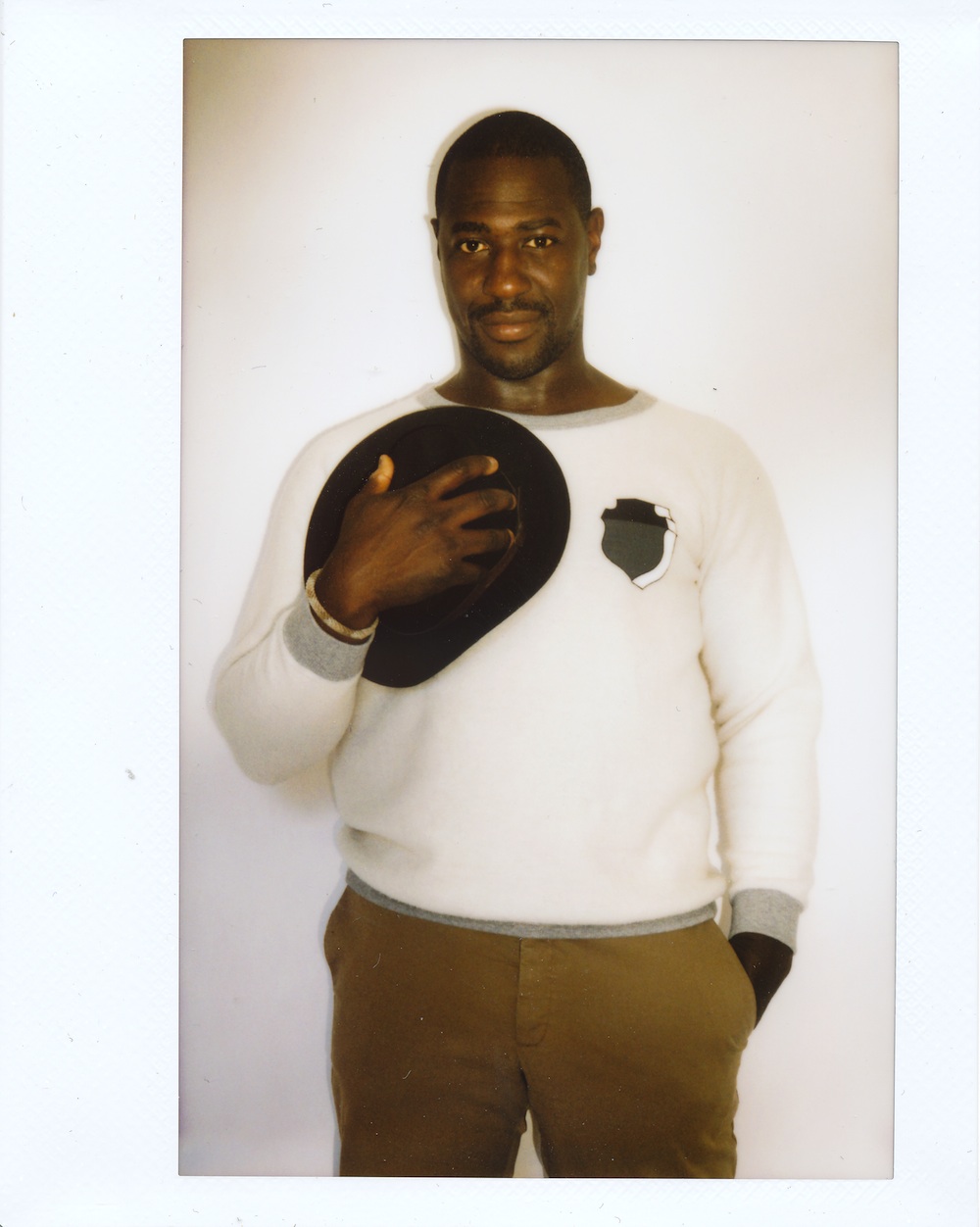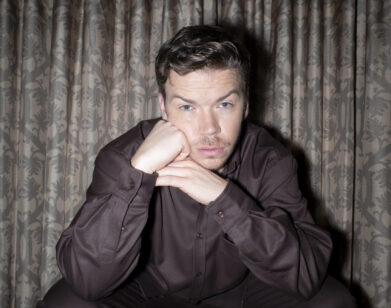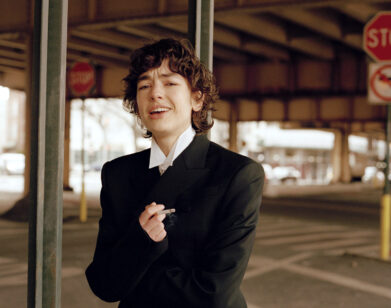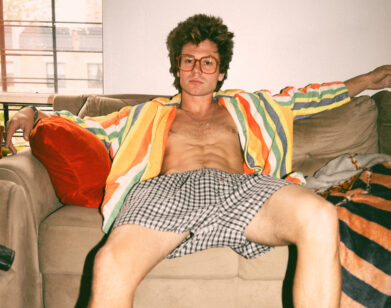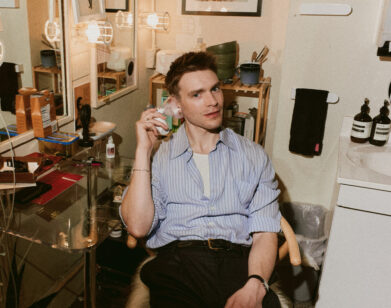Jacky Ido: From Burkina Faso to Inglorious Basterds and Taxi Brooklyn
French actor Jacky Ido is charming both on and off-screen. His new NBC TV show, Taxi Brooklyn, revels in the fact that once he flashes his big, wide smile, all past transgressions are forgiven. It is, after all, the very same smirk that made Melanie Laurent weak at the knees in Quentin Tarantino’s revisionist World War II drama Inglorious Basterds. In Basterds, Ido played the pyrotechnic projectionist tasked with screening a fatal movie for the Nazis.
Now, it’s New Yorkers who are being blown away by his charisma. In Taxi Brooklyn Ido portrays a fast-talking cab driver who outfoxes both criminals and the police. While the show has met with some decidedly mixed reviews, critics have been united in praising the immensely likeable French actor.
Born in Burkina Faso, Ido first came to prominence in France as a slam musician under the guise of John Pucc’Chocolat, but it’s his career as an actor that has brought him global attention. His career has seen him jump through projects in Germany, France and America. As Taxi Brooklyn premieres on NBC, we run the meter on the French star.
KALEEM AFTAB: So, can you tell me about Taxi Brooklyn?
JACKY IDO: Taxi Brooklyn is a TV show freely adapted from Luc Besson’s Taxi film series. I play Leo Rumba, an ex-con who has fled Marseilles to become a cab driver in New York. He becomes an involuntary getaway driver and he’s going to get busted for this by New York detective Cat Sullivan (Chyler Leigh). Initially, he has to try to prove his innocence.
AFTAB: What’s your personal experience of New York taxis?
IDO: Basically when I’m in New York I either walk or take cabs, so I have a lot of New York taxi stories. I went to New York in 2005 with my brother Cedric [an actor who appeared in Spike Lee’s Miracle of St. Anna] and a friend of mine, who became a huge star in France, Fabian [Marsaud, the slam poet Grand Corps Malade]. We were coming from JFK to Manhattan, crossing the bridge, and the taxi driver who was Hispanic starts playing Charles Aznavour, but in Spanish. We said, “It’s great you know Charles Aznavour,” and then he turned around and said to us, “Oh you know him? He’s from our country, he’s great.” That’s when I learned that Charles Aznavour is well known in South America, and people think that he belongs to them.
AFTAB: Isn’t that a bit like you? You seem to be a vagabond of the world, making films in Germany, France, America—won’t people wonder where you’re from too?
IDO: I’m a hybrid, and I kind of like that. Raised by African parents, growing up I lived between Burkina Faso and Stains, a suburb just outside of Paris. In Stains I had all the cultures in the world on my doorstep and that opens up your mind.
AFTAB: As a youngster you played basketball. When did you discover you were an entertainer rather than a basketball player?
IDO: After I injured myself 10,000 times. I loved playing basketball but, at the same time, I was doing a lot of things on the side. While my teammates were resting, I would go to the cinema, I would write—I tried to do the things that interested me. I studied all aspects of cinema. I was training hard and I was partying hard. I was bulimic; I wanted everything.
AFTAB: What films did you watch? Who took you?
IDO: My parents. I was lucky enough to have parents with a huge film library. My mum is a huge Bollywood film geek. When we were kids we would watch Indian films with her, as well as Chinese and Japanese films. My father was more into the classics, American films, and also Hitchcock films. I first watched the whole collection of Hitchcock films when I was 11 or 12 thanks to my father’s film library. I think that the first film I saw in the theater was The AristoCats. I was like, “Oh my god, this is brilliant!” That’s when I knew I wanted to work in cinema. I was four or five.
AFTAB: How did you get into the movie business?
IDO: Coming from Stains and infiltrating the movie business was something impossible to achieve. In France, it’s tough when you don’t know anybody and are not anybody’s son. I went to University and did something different. I studied foreign languages and banking and insurance. While they were giving those classes I would escape and go to the film department and learn something from the film teachers, it was my hobby. I would make documentaries and then starve in between them saving my money to buy film stock.
AFTAB: So if you were such a cinema geek, how did you end up getting fame as a slam poet?
IDO: I was in my 20s and a frustrated filmmaker and frustrated actor. I even had a little theater company called Le Replik and was organizing festivals. I was frustrated because I didn’t have the finances or the team to make the films I wanted. So the first time I got into contact with the slam poetry world, my jaw dropped, I thought this is easy, all you need is a pen and paper and the guts to get up on stage and say whatever it is you want to say.
AFTAB: So you had no problem getting up on stage?
IDO: Au contraire. I was so shy it took me two years to get on stage. I didn’t mind acting, because you had this character’s mask to put on, but on stage—even though I had a ridiculous nickname—you are still out there and naked. In the end I got on stage after I lost a bet.
AFTAB: What was the bet?
IDO: The bet was that I won’t tell you.
AFTAB: I won’t tell anyone…
IDO: [laughs]
AFTAB: Clearly it wasn’t over sports, so was it about a woman?
IDO: Ah, it was something about a girl. Anyway, I went to Paris, which was where all the poetry slams took place, and I took my friends Fabian and Sammy with me. I remember I got up on that stage, I was shaking and I had this paper flickering in my hand. When I finished, there was a standing ovation for about 10 minutes—it was crazy.
AFTAB: And that inspired you to carry on?
IDO: We started going every week and then we created our own slam poetry night in Saint-Denis that ran for seven or eight years.
AFTAB: The album made by your friend Grand Corp Malade was a huge hit in France, and you appeared on many of his hit songs under the guise John Pucc’Chocolat. Was that your silly nickname? Is it because you eat a log of chocolate?
IDO: I am a huge chocolate eater and I’m a big fan of cappuccinos and so very unconsciously, all these things mixed together to give me a name. I didn’t even think about it. We had gone to a disco and were on the guest list, but it was taking the bouncer forever to sort it out and so we started giving fake names to everyone he let into the club. Eventually he asked me what my name was and I just said John Pucc’Chocolat. Then my friend was rolling around on the ground laughing and he told everyone and the name stuck.
AFTAB: But the success of the album and touring seemed to lead to you becoming an actor?
IDO: I never had it in my mind to be an actor. In fact, I think I tried my best to fail at it. I just thought it would pay the bills between the films that I wanted to direct.
AFTAB: What do you mean you tried to fail?
IDO: One day I got a call from a casting director who said they wanted to audition me to play a Masai in an adaptation of Corinne Hoffmann’s novel The White Masai. I just thought it would be full of clichés about Africa so I didn’t call them back. They sent me the script and after reading seven pages, I thought this is good, I should at least try, not thinking I would get the part. I had to audition in Germany. I live 15 minutes away from the airport in Paris by train, and on the day of the flight there was a strike. It’s France, what can I say. That day it took over an hour to get to the airport. So I made the call to say sorry I’d missed the flight and amazingly they booked me on another flight that day. But when the time came to get the next flight, somehow there was a mix-up and I hadn’t picked up the right boarding card and they wouldn’t let me board. I took the phone again—now this is a call you don’t want to make.
AFTAB: And you still landed the part?
IDO: I could hear the frustration in the voice on the other end of the call, but he said, “I shall call you back shortly.” Somehow they invited me to come and audition the following Tuesday. On the weekend I had a basketball tournament and we won, but I broke my finger. Finally on the Tuesday, I made it to Berlin. I took flowers for the actress Nina Hoss and the director Hermine Huntgeburth. And then I acted like I’d never acted before. It was getting this role despite everything that made me realize that acting was my real calling. I fought against it so hard, but no matter what I did and the more I messed up, the more I was rescued.
AFTAB: And how did you come to work with Quentin Tarantino?
IDO: There was a casting audition in France and he had a shortlist of people he wanted to see and he organized a sit down for half an hour. That’s the way he auditions people, chatting one-on-one before doing an audition. We start talking about his acting experience, the fact that he wanted to be an actor and he became a director, and he told me that at some point he realized he would never act for the directors he idolized because they were mostly dead. Then I talked about my story, wanting to be a director and ending up acting. Two hours passed by and we hadn’t even done the audition together.
AFTAB: Inglourious Basterds was also shot in Germany, what is it about you and that place?
IDO: There is something with Germany and me that is a love story. Every time I mess up, Germany pulls me back in. Every time I do a big movie, I come back to Stains trying to make something with my friends, trying to bring everybody up with me; that’s also a kind of tribal behavior that people from the suburbs have. I was glad because we were filming in Berlin and it’s a city that I really love. For one month Melanie Laurent and I, we were training to be projectionists and after that we were filming for four months. When we were not shooting, they still wanted us to be on standby, which was hard because I just had my first son [Ido now has two boys] and it was hard not to be with my family back then. Yet at the same time, I was living the most wonderful film experience of my life, it was a celebration.
AFTAB: What do you remember most?
IDO: We had screenings on Thursday nights. Tarantino would bring a film print from his own collection. We would drink beer; there would be Michael Fassbender [and] Brad Pitt and his kids watching a film. It was just amazing because it felt like all these huge stars were gathered to celebrate this director’s vision.
AFTAB: Taxi Brooklyn is unusual in that it actually filmed in New York. What were your favorite things to do in the city?
IDO: I love good food and natural wine. I am so French in that sense. My friends who own restaurants and are natural wine producers, they sent me to some wild addresses in New York. One of my favorites was Roberta’s in Brooklyn.
AFTAB: Can you drive around Brooklyn with your eyes closed now?
IDO: I know New York. I lived there for a little bit. I worked there on an independent film called In the Morning, which isn’t released yet and is also set in Brooklyn. I always say Stains is a small version of Brooklyn. I grew up in a little bubble of Brooklyn in France! In Stains, I was learning to speak English, I was listening to Biggie Smalls and KRS-One and so I basically lived the life by proxy. At the same time, I had the same problems and issues they were singing about right next to me, so it was easy to identify with it. So when I was in Brooklyn, I had this sensation that I was at my house.
THE SECOND EPISODE OF TAXI BROOKLYN AIRS TONIGHT, JULY 2, ON NBC.

